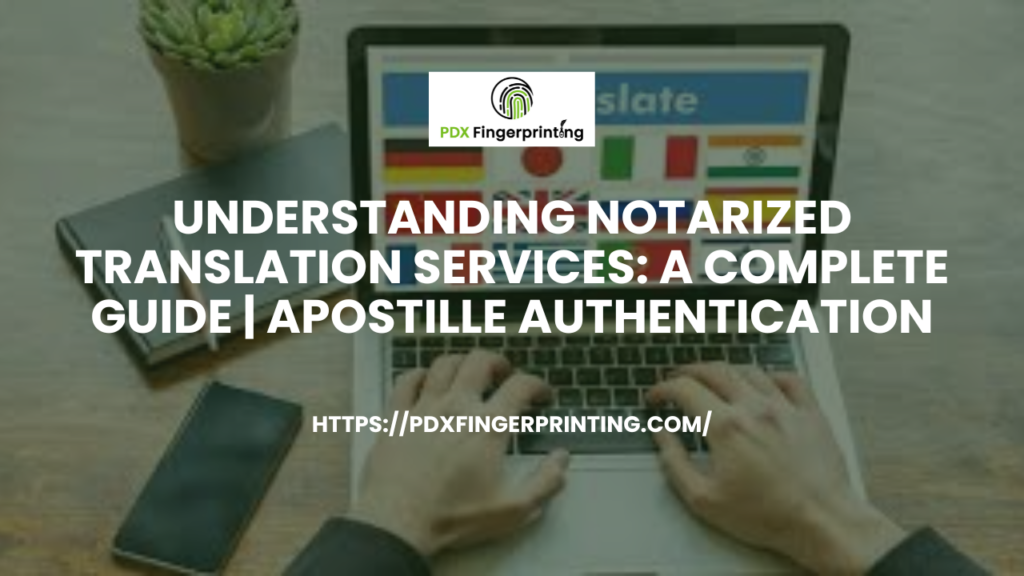
Notarized translation services play a crucial role in ensuring the accuracy, legality, and authenticity of translated documents, especially when dealing with international matters. In this comprehensive guide, we will delve into the intricacies of notarized translation services and shed light on the significance of Apostille & Authentication in the process.
Introduction to Notarized Translation Services
Notarized translation services serve as a bridge between languages and legal systems, facilitating communication and comprehension across borders. Whether it’s personal documents like birth certificates and marriage licenses or business contracts and legal agreements, notarized translations provide an official seal of approval, instilling trust and confidence in the translated content.
What is Notarized Translation?
Notarized translation involves the translation of documents by a qualified translator followed by the certification of the accuracy and completeness of the translation by a notary public. This additional step adds a layer of authenticity and credibility to the translated document, making it legally binding and admissible in court proceedings, administrative processes, and other official matters.
Understanding Apostille & Authentication
Apostille & authentication is a form of legalization that verifies the authenticity of a document for use in foreign countries. It is particularly essential for documents intended for countries that are parties to the Hague Apostille Convention. The apostille certificate, affixed by a competent authority designated by the country of issuance, confirms the validity of the document and ensures its acceptance abroad without the need for further authentication.
Key Features of Notarized Translation Services
Accuracy
One of the primary features of notarized translation services is the utmost accuracy in translation. Qualified translators with expertise in both the source and target languages meticulously translate each document, ensuring that the content is faithfully rendered without any loss of meaning or context.
Legal Recognition
Notarized translations carry legal recognition due to the certification provided by a notary public. This certification attests to the authenticity of the translation and the identity of the translator, making the document legally binding and acceptable in legal proceedings and official transactions.
Security
Notarized translations are secure and tamper-proof, thanks to the seals and signatures affixed by the translator and the notary public. These security measures prevent unauthorized alterations or modifications to the translated document, safeguarding its integrity and authenticity.
Process of Notarized Translation Services
The process of notarized translation services involves several steps to ensure accuracy, legality, and authenticity.
- Document Preparation: The client provides the original document to be translated, along with any specific instructions or requirements.
- Translation: A qualified translator proficient in both the source and target languages translates the document, maintaining accuracy and fidelity to the original content.
- Notarization: The translated document is certified by a notary public, who verifies the accuracy of the translation and the identity of the translator.
- Apostille & Authentication: If required, the document undergoes apostille authentication by the competent authority designated by the country of issuance, confirming its validity for use abroad.
Benefits of Notarized Translation Services
International Acceptance
Notarized translations are universally recognized and accepted in legal, governmental, and academic institutions worldwide, facilitating seamless communication and collaboration across borders.
Legal Compliance
By adhering to legal requirements and standards, notarized translations ensure compliance with regulations governing the use of translated documents in official matters, thereby avoiding potential legal complications or disputes.
Authenticity
The certification provided by a notary public and, if applicable, apostille & authentication, attest to the authenticity and reliability of the translated document, instilling confidence in its accuracy and completeness.
Who Needs Notarized Translation Services?
Notarized translation services are essential for various individuals, businesses, and legal entities operating in a globalized world.
- Individuals: Individuals may require notarized translations for personal documents such as birth certificates, marriage licenses, academic transcripts, and immigration papers.
- Businesses: Businesses often need notarized translations for contracts, agreements, financial statements, patents, and other legal documents essential for international trade and commerce.
- Legal Entities: Legal entities such as law firms, government agencies, and international organizations rely on notarized translations for legal pleadings, court orders, regulations, and treaties.
Cost Considerations
The cost of notarized translation services can vary depending on various factors, including the complexity of the document, the languages involved, and the turnaround time.
- Factors Affecting Cost: Factors such as word count, document type, and additional services like apostille & authentication can influence the overall cost of notarized translations.
- Pricing Models: Translation agencies may offer different pricing models, including per-word rates, flat fees, or hourly rates, depending on the specific requirements of the project.
Common Misconceptions About Notarized Translation Services
Despite their importance, notarized translation services are often surrounded by misconceptions that need to be addressed.
- Not Necessary for All Documents: While notarized translations are essential for certain legal and official documents, they may not be required for all types of content.
- Only for Legal Purposes: Notarized translations are not limited to legal purposes but can also be beneficial for personal, academic, and business-related documents.
- Complex and Time-Consuming: While the process of notarized translation involves several steps, it can be streamlined with efficient communication and collaboration between the client, translator, and notary public.
How to Ensure Quality in Notarized Translation Services
Ensuring quality in notarized translation services requires attention to detail and adherence to best practices.
- Choosing Qualified Translators: Select translators with expertise in the relevant subject matter and languages, preferably certified by recognized translation associations.
- Reviewing Samples: Request samples of previous work to evaluate the translator’s proficiency and style, ensuring compatibility with the requirements of the project.
- Communication and Feedback: Maintain open communication with the translator throughout the translation process, providing feedback and clarifications as needed to ensure accuracy and satisfaction.
Conclusion
Notarized translation services play a vital role in bridging linguistic and legal barriers, facilitating communication and collaboration in a globalized world. By understanding the key features, process, benefits, and considerations associated with notarized translations, individuals and businesses can ensure the accuracy, legality, and authenticity of their translated documents, thereby enabling smooth interactions across borders.
FAQs About Notarized Translation Services
- What is the difference between notarized translation and regular translation?
- Notarized translation involves the additional step of certification by a notary public, whereas regular translation does not require such authentication.
- Is notarized translation necessary for all documents?
- Notarized translation is typically required for legal and official documents intended for use in foreign countries or legal proceedings.
- How long does the notarized translation process take?
- The duration of the notarized translation process depends on factors such as the complexity of the document, the availability of the translator and notary, and any additional services required.
- Can any translator provide notarized translation services?
- Notarized translation services should be performed by qualified translators with expertise in the relevant subject matter and languages, preferably certified by recognized translation associations.
- What documents commonly require notarized translation?
- Documents commonly requiring notarized translation include birth certificates, marriage licenses, academic transcripts, contracts, and legal agreements intended for international use.

